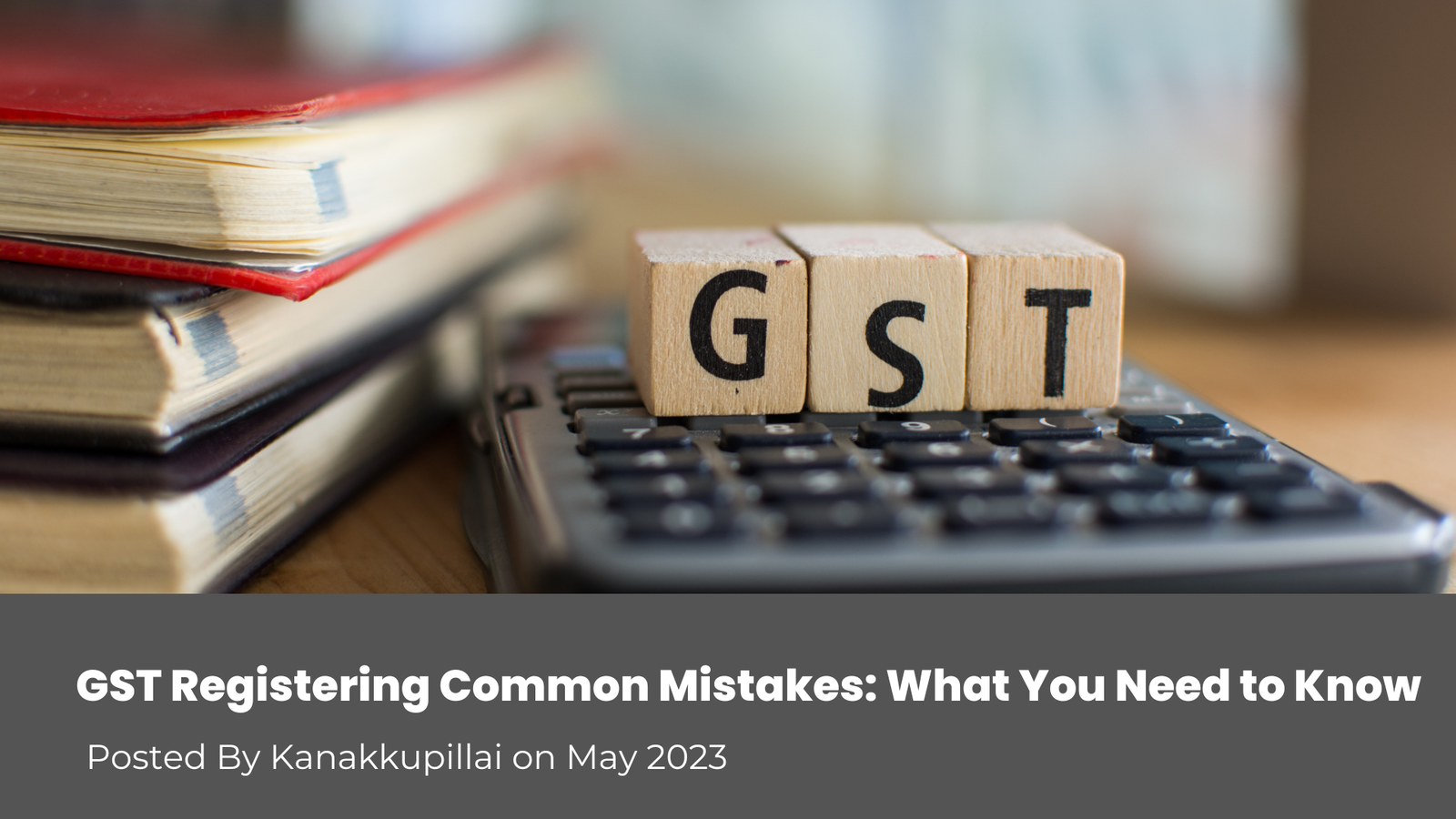![]()
GST: The Ultimate Guide to Registering Common Mistakes
Hey there, fellow business owners and aspiring entrepreneurs! Are you ready to dive into the fascinating world of Goods and Services Tax (GST) registration? Before you do, let’s spare a moment to talk about something crucial – the common mistakes that can trip you up along the way. Yes, we’re about to unveil the top blunders that many individuals make when registering for GST. So, buckle up and get ready to navigate the registration process smoothly without stumbling over these GST registration mistakes.
In this comprehensive guide, we’ll equip you with the knowledge to sidestep potential pitfalls and ensure a seamless GST registration experience. Whether you’re a seasoned business owner or venturing into the exciting world of entrepreneurship for the first time, understanding these common errors can save you valuable time, effort, and maybe even a few headaches.
Why should you pay attention to GST registration mistakes? Well, simply put, avoiding these missteps can help you avoid penalties, legal complications, and unnecessary delays. Let’s face it, nobody wants to get caught up in a bureaucratic maze or be on the wrong side of the law. By taking the time to familiarize yourself with these common pitfalls, you’ll be well-equipped to handle the intricacies of GST registration like a pro.
KEY TAKEAWAYS
- Throughout this guide, we’ll shed light on the most prevalent GST registration mistakes that even seasoned professionals tend to make.
- Choosing the Correct Registration Type – Select the correct GST registration type, When registering under GST in India, it is crucial to select the correct GST registration type based on your business nature and requirements.
- When registering for GST in India, you need to choose between the regular and composition scheme based on your business requirements.
- Respond to GST officer queries promptlyWhen interacting with GST officers, it is important to respond to their queries promptly.
- Being prepared with the required documentation ensures a smooth and timely registration process.
Throughout this guide, we’ll shed light on the most prevalent GST registration mistakes that even seasoned professionals tend to make. From overlooking mandatory documentation to misunderstanding registration thresholds, we’ll cover it all. Each mistake will be dissected, demystified, and accompanied by practical tips and advice to help you stay on track and sail through the registration process smoothly.
So, grab a cup of coffee, settle in, and let’s unravel the mysteries of GST registration mistakes together. By the end of this guide, you’ll be armed with the knowledge you need to avoid these blunders and ensure a successful GST registration journey. Trust us, your future self will thank you!
Let’s get started!
Understanding the GST Registration Process
Know the GST registration threshold
The GST registration threshold in India varies based on the nature of the business and the state. For most states, the threshold is Rs. 40 lakhs for businesses engaged in the supply of goods and Rs. 20 lakhs for businesses engaged in the supply of services.
Understand the GST registration types
In India, there are various types of GST registrations based on the nature of the business and the taxpayer’s requirements. The common types include Regular/Normal GST Registration, Composition Scheme Registration for small taxpayers, Non-Resident GST Registration for foreign entities, and Casual Taxable Person Registration for temporary businesses. Additionally, there are separate registrations for Input Service Distributors, E-commerce operators, and TDS (Tax Deducted at Source) deductions.
Identify if you are eligible for GST registration
To determine if you are eligible for GST registration in India, you need to consider the following factors:
- Threshold Turnover: Check if your annual aggregate turnover exceeds the threshold limit. For most states, it is Rs. 40 lakhs for goods and Rs. 20 lakhs for services. However, lower thresholds may apply for certain special category states.
- Inter-State Supply: If your business engages in inter-state supply of goods or services, registration is mandatory regardless of the turnover threshold.
- Specific Business Categories: Certain businesses, such as e-commerce operators, Input Service Distributors, and TDS deductions, are required to register irrespective of their turnover.
Providing Accurate Information
Ensure your business details are accurate
When registering for GST, it is crucial to ensure that your business details are accurate. Provide correct information such as legal name, address, contact details, and nature of business. Inaccurate details can lead to complications and delays in the registration process or future compliance issues.
Provide correct bank account information
While registering under GST in India, it is essential to provide accurate bank account information. This includes the bank account number, IFSC code, and other relevant details. Incorrect bank account information can lead to issues with receiving refunds or making electronic payments under GST.
Verify your PAN and Aadhaar details
While registering under GST in India, it is important to verify your PAN and Aadhaar details to ensure accuracy and compliance with the registration process.
Choosing the Correct Registration Type
Select the correct GST registration type
When registering under GST in India, it is crucial to select the correct GST registration type based on your business nature and requirements. Choose the appropriate category, such as Regular/Normal Registration, Composition Scheme Registration, Non-Resident Registration, Casual Taxable Person Registration, or other specific registrations based on your business activities and eligibility.
Choose between regular and composition scheme
When registering for GST in India, you need to choose between the regular and composition scheme based on your business requirements. The regular scheme is suitable for regular taxpayers, while the composition scheme is applicable for small taxpayers with certain eligibility criteria and reduced compliance requirements.
Register for multiple businesses under the same PAN
It is possible to register multiple businesses under the same PAN while registering for GST in India. The GST portal allows you to add multiple business verticals or separate businesses under a single PAN, streamlining the registration process for businesses operated by the same entity.
Filing for GST in a Timely Manner
Submit your application within the due date
It is crucial to submit your application for GST registration within the due date. Failure to do so may lead to penalties and non-compliance issues. Ensure that you gather all necessary documents, complete the application accurately, and submit it before the deadline to avoid any complications or delays in the registration process.
Schedule your GST registration appointment
As of my knowledge cutoff in September 2021, there is no requirement to schedule a specific appointment for GST registration in India. The registration process can be completed online through the GST portal. However, it is recommended to allocate sufficient time to gather the required documents and complete the registration process promptly.
Respond to GST officer queries promptly
When interacting with GST officers, it is important to respond to their queries promptly. Timely and accurate responses demonstrate your commitment to compliance and can help resolve any issues efficiently. It is advisable to maintain proper documentation and communication channels to facilitate effective communication with GST officers during audits or investigations.
Ensuring Adequate Documentation
Keep all necessary documents ready
When applying for GST registration, it is essential to keep all necessary documents ready. These may include PAN card, Aadhaar card, address proof, bank account details, business registration documents, ownership proof, and other supporting documents specific to your business. Being prepared with the required documentation ensures a smooth and timely registration process.
Provide a valid address proof
When registering for GST in India, you need to provide a valid address proof. Acceptable address proof documents include electricity bill, telephone bill, rent agreement, property tax receipt, or any other document issued by a government authority that verifies your business’s address.
Provide all required business documents
During GST registration in India, you must provide all required business documents. These typically include PAN card, Aadhaar card, address proof, bank account details, photographs, memorandum/articles of association, partnership deed, registration certificate, and other documents specific to the nature of your business. Ensure you have these documents ready for a smooth registration process.
Maintaining Consistency in Details
Keep consistent details in all documents
When registering for GST in India, it is crucial to maintain consistent details across all documents submitted. This includes details such as business name, address, authorized signatories, and contact information. Consistency ensures accuracy, reduces the chances of discrepancies, and facilitates a smooth registration process without unnecessary delays or complications.
Provide matching bank account details
While registering for GST in India, it is important to provide matching bank account details. Ensure that the bank account number, account holder’s name, and IFSC code provided during registration match the details of the bank account held by the business entity. Mismatched bank account details can lead to registration complications.
Ensure the same registered address on all documents
It is crucial to ensure that the registered address is the same on all documents submitted for GST registration in India. Consistency in the registered address across documents such as PAN card, Aadhaar card, bank statements, and other supporting documents helps avoid discrepancies and ensures a smooth and successful registration process.
Avoiding Common Mistakes
Avoid duplicate GST registration
One common mistake to avoid during GST registration in India is the occurrence of duplicate registrations. Care should be taken to ensure that multiple registrations are not obtained for the same business entity, as it can lead to compliance issues and unnecessary complexities. Maintain accurate records and review existing registrations to prevent duplications.
Verify your details before submitting
Before submitting your GST registration application in India, it is vital to verify your details thoroughly to avoid common mistakes. Double-check your business name, PAN, address, contact information, bank details, and supporting documents for accuracy. This ensures a smooth registration process and minimizes the chances of errors or rejections.
Ensure your accountant files your GST return regularly
After GST registration in India, it is important to ensure that your accountant files your GST returns regularly. Timely and accurate filing of GST returns helps maintain compliance with the GST law and avoids penalties. Regular monitoring of GST compliance by a knowledgeable accountant is crucial for smooth and error-free return filing.
Seeking Professional Assistance
Hire a GST consultant for registration
Hiring a GST consultant for the registration of GST in India can be beneficial. A GST consultant can provide expert guidance, ensure compliance with regulations, assist in preparing documentation, and streamline the registration process, helping you navigate complexities and avoid potential mistakes.
Seek legal guidance for complex cases
In complex cases under GST in India, it is advisable to seek legal guidance. Consulting a qualified tax professional or a GST lawyer or Chartered Accountant can help you:
- Understand the intricacies,
- Navigate legal complexities, and
- Ensure compliance with GST laws, minimizing potential risks and ensuring a proper resolution.
Kanakkupillai is one such group of professionals who can aid you through hassle-free GST registration and compliance.
Keeping Track of GST Changes
Stay up-to-date with GST regulations
It is crucial to stay up-to-date with GST regulations even after GST registration in India. Regularly review updates, notifications, and circulars issued by the GST authorities to ensure compliance, understand any changes in rules or rates, and adapt your business processes accordingly.
It is important to regularly check for updates in GST rates in India. Stay informed about any changes or revisions in GST rates for different goods and services to ensure accurate tax calculations and compliance with the updated rates.
To stay informed about GST news, circulars, and law changes in India, it is advisable to regularly follow reliable sources such as government websites, official GST portals, tax publications, and professional forums for the latest updates and announcements related to GST.
But all these would not only cost you time and penalty arising from failure to compliance but also compromising credibility of your entity attracting the tax authorities.
Hence it is always recommended to hire an expert from the market like Kanakkupillai with more than 10 years of market experience and 1000’s of experts on board.
Message Us today and we assure you quality service at the best price. Click here Kanakkupillai.





